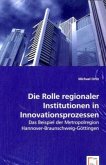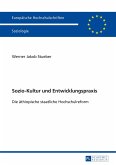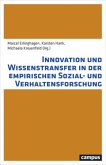- Broschiertes Buch
- Merkliste
- Auf die Merkliste
- Bewerten Bewerten
- Teilen
- Produkt teilen
- Produkterinnerung
- Produkterinnerung
Im Wettbewerb der Volkswirtschaften ist die Governance von Innovation und Wissenstransfer ein zentraler Faktor. Michael Ortiz vergleicht für die Automobilbranche und die Biotechnologie, wie die Innovationsregime in Deutschland, Großbritannien und Spanien
gestaltet werden. Er liefert damit wichtige Erkenntnisse zu den Gründen für ökonomische Erfolge und Misserfolge in den betrachteten Ländern und Regionen.
Andere Kunden interessierten sich auch für
![Die Rolle regionaler Institutionen in Innovationsprozessen Die Rolle regionaler Institutionen in Innovationsprozessen]() Michael OrtizDie Rolle regionaler Institutionen in Innovationsprozessen59,00 €
Michael OrtizDie Rolle regionaler Institutionen in Innovationsprozessen59,00 €![Sozio-Kultur und Entwicklungspraxis Sozio-Kultur und Entwicklungspraxis]() Werner Jakob StueberSozio-Kultur und Entwicklungspraxis40,05 €
Werner Jakob StueberSozio-Kultur und Entwicklungspraxis40,05 €![Wissens- und Technologietransfer im inner- und interdisziplinären Vergleich Wissens- und Technologietransfer im inner- und interdisziplinären Vergleich]() Nicole SchulzeWissens- und Technologietransfer im inner- und interdisziplinären Vergleich64,99 €
Nicole SchulzeWissens- und Technologietransfer im inner- und interdisziplinären Vergleich64,99 €![Erfolgreicher Transfer in der Arbeitsgestaltung Erfolgreicher Transfer in der Arbeitsgestaltung]() Erfolgreicher Transfer in der Arbeitsgestaltung42,90 €
Erfolgreicher Transfer in der Arbeitsgestaltung42,90 €![Wandel durch Technik Wandel durch Technik]() Ulrich DolataWandel durch Technik26,90 €
Ulrich DolataWandel durch Technik26,90 €![Innovationsfähigkeit im demografischen Wandel Innovationsfähigkeit im demografischen Wandel]() Innovationsfähigkeit im demografischen Wandel39,90 €
Innovationsfähigkeit im demografischen Wandel39,90 €![Innovation und Wissenstransfer in der empirischen Sozial- und Verhaltensforschung Innovation und Wissenstransfer in der empirischen Sozial- und Verhaltensforschung]() Innovation und Wissenstransfer in der empirischen Sozial- und Verhaltensforschung45,00 €
Innovation und Wissenstransfer in der empirischen Sozial- und Verhaltensforschung45,00 €-
-
-
Im Wettbewerb der Volkswirtschaften ist die Governance von Innovation und Wissenstransfer ein zentraler Faktor. Michael Ortiz vergleicht für die Automobilbranche und die Biotechnologie, wie die Innovationsregime in Deutschland, Großbritannien und Spanien
gestaltet werden. Er liefert damit wichtige Erkenntnisse zu den Gründen für ökonomische Erfolge und Misserfolge in den betrachteten Ländern und Regionen.
Hinweis: Dieser Artikel kann nur an eine deutsche Lieferadresse ausgeliefert werden.
gestaltet werden. Er liefert damit wichtige Erkenntnisse zu den Gründen für ökonomische Erfolge und Misserfolge in den betrachteten Ländern und Regionen.
Hinweis: Dieser Artikel kann nur an eine deutsche Lieferadresse ausgeliefert werden.
Produktdetails
- Produktdetails
- Akteure und Strukturen. Studien zur vergleichenden empirischen Sozialforschung 3
- Verlag: Campus Verlag
- Artikelnr. des Verlages: 39898
- Seitenzahl: 507
- Erscheinungstermin: 13. Mai 2013
- Englisch
- Abmessung: 217mm x 143mm x 35mm
- Gewicht: 626g
- ISBN-13: 9783593398983
- ISBN-10: 3593398982
- Artikelnr.: 36812559
- Herstellerkennzeichnung Die Herstellerinformationen sind derzeit nicht verfügbar.
- Akteure und Strukturen. Studien zur vergleichenden empirischen Sozialforschung 3
- Verlag: Campus Verlag
- Artikelnr. des Verlages: 39898
- Seitenzahl: 507
- Erscheinungstermin: 13. Mai 2013
- Englisch
- Abmessung: 217mm x 143mm x 35mm
- Gewicht: 626g
- ISBN-13: 9783593398983
- ISBN-10: 3593398982
- Artikelnr.: 36812559
- Herstellerkennzeichnung Die Herstellerinformationen sind derzeit nicht verfügbar.
Contents
Preface9
1. Introduction11
2. Discussing Central Concepts and Definitions21
2.1 Knowledge Transfer: Economic Action and Knowledge Economy21
2.1.1 The Emergence of Knowledge Economy21
2.1.2 What Is "Knowledge" and How Can It Be "Transferred"? 22
2.2 The Institutional Embeddedness of Innovation and Learning 29
2.2.1 Defining Innovation29
2.2.2 The Systemic Character of Innovation and Knowledge Transfer32
2.2.3 A Sociological Perspective on Innovation Systems35
2.2.4 The "Governance" of Social Systems of Innovation
and Production37
2.3 Production Regimes: Institutional Frameworks for
Knowledge Transfer41
2.3.1 National Production Regimes-The Varieties-of-Capitalism-
Approach43
2.3.2 Liberal and Coordinated Market Economies44
2.3.3Institutional Coherence, Complementarity and
Modes of Innovation47
2.3.4 Criticizing the Varieties-of-Capitalism-Approach50
2.4 The Innovation Systems Approach-Spatial Dimensions
of Innovation55
2.4.1 National Innovation Systems56
2.4.2 Regional Innovation Systems-Approaching a Fuzzy Concept59
2.5 A Heuristic Model of Regional Knowledge Transfer Systems86
3. Hypothesizing Structures and Mechanisms of Knowledge Transfer
in Varieties of Capitalism94
3.1 Hypothesized Structures and Mechanisms in CMEs95
3.2 Hypothesized Structures and Mechanisms in LMEs101
3.3 Hypothesized Structures and Mechanisms in MMEs104
3.4 Summary108
4. A Qualitative Approach to Innovation System Analysis110
4.1 Conceptualizing an Internationally Comparative Qualitative
Case Study: The Choice for a Qualitative Approach110
4.2 Sampling Strategies and Selection Criteria114
4.3 Selecting the National and Regional Cases120
4.4 The Guideline-Based Expert Interview as Research Method123
4.5 Selection of Experts as Units of Observation125
4.6 Evaluation Methods: Aggregation and Triangulation127
4.7 Quality Criteria and Analytical Generalization of the Results132
5. Germany-Knowledge Transfer Systems in a
Coordinated Economy137
5.1 The German Economy-Conserving Industrial Structures137
5.2 The Case of Baden-Württemberg144
5.2.1 Locating Baden-Württemberg in the German Context144
5.2.2 Structures and Mechanisms of Knowledge Transfer in
Baden-Württemberg: Six Governance Dimensions151
5.2.3 Summary.183
5.3 The Case of the Metropolitan Region Hannover Braunschweig
Göttingen Wolfsburg188
5.3.1 Locating the Metropolitan Region HBGW in the
German Context188
5.3.2 Structures and Mechanisms of Knowledge Transfer in the
Metropolitan Region HBGW: Six Governance Dimensions196
5.3.3 Summary230
5.4 Lessons from the German Case236
6. Spain-Knowledge Transfer Systems in a
Mediterranean Economy243
6.1 The Spanish Economy-Some Structural Facts.243
6.2 The Case of Catalonia250
6.2.1 Locating Catalonia in the Spanish Context250
6.2.2 Structures and Mechanisms of Knowledge Transfer in
Catalonia: Six Governance Dimensions256
6.2.3 Summary285
6.3 The Case of the Madrid Community292
6.3.1 Locating the Madrid Community in the Spanish Context292
6.3.2 Structures and Mechanisms of Knowledge Transfer the
Madrid Community: Six Governance Dimensions298
6.3.3 Summary327
6.4 Lessons from the Spanish Case332
7. UK-Knowledge Transfer Systems in a Liberal Market Economy340
7.1 The UK Economy-A Service Dominated Economy340
7.2 The East of England Case348
7.2.1 Locating the East of England in the UK Context348
7.2.2 Structures and Mechanisms of Knowledge Transfer in the
East of England: Six Governance Dimensions355
7.2.3 Summary382
7.3 The Greater London Case388
7.3.1 Loca
Contents
Preface9
1. Introduction11
2. Discussing Central Concepts and Definitions21
2.1 Knowledge Transfer: Economic Action and Knowledge Economy21
2.1.1 The Emergence of Knowledge Economy21
2.1.2 What Is "Knowledge" and How Can It Be "Transferred"? 22
2.2 The Institutional Embeddedness of Innovation and Learning 29
2.2.1 Defining Innovation29
2.2.2 The Systemic Character of Innovation and Knowledge Transfer32
2.2.3 A Sociological Perspective on Innovation Systems35
2.2.4 The "Governance" of Social Systems of Innovation
and Production37
2.3 Production Regimes: Institutional Frameworks for
Knowledge Transfer41
2.3.1 National Production Regimes-The Varieties-of-Capitalism-
Approach43
2.3.2 Liberal and Coordinated Market Economies44
2.3.3Institutional Coherence, Complementarity and
Modes of Innovation47
2.3.4 Criticizing the Varieties-of-Capitalism-Approach50
2.4 The Innovation Systems Approach-Spatial Dimensions
of Innovation55
2.4.1 National Innovation Systems56
2.4.2 Regional Innovation Systems-Approaching a Fuzzy Concept59
2.5 A Heuristic Model of Regional Knowledge Transfer Systems86
3. Hypothesizing Structures and Mechanisms of Knowledge Transfer
in Varieties of Capitalism94
3.1 Hypothesized Structures and Mechanisms in CMEs95
3.2 Hypothesized Structures and Mechanisms in LMEs101
3.3 Hypothesized Structures and Mechanisms in MMEs104
3.4 Summary108
4. A Qualitative Approach to Innovation System Analysis110
4.1 Conceptualizing an Internationally Comparative Qualitative
Case Study: The Choice for a Qualitative Approach110
4.2 Sampling Strategies and Selection Criteria114
4.3 Selecting the National and Regional Cases120
4.4 The Guideline-Based Expert Interview as Research Method123
4.5 Selection of Experts as Units of Observation125
4.6 Evaluation Methods: Aggregation and Triangulation127
4.7 Quality Criteria and Analytical Generalization of the Results132
5. Germany-Knowledge Transfer Systems in a
Coordinated Economy137
5.1 The German Economy-Conserving Industrial Structures137
5.2 The Case of Baden-Württemberg144
5.2.1 Locating Baden-Württemberg in the German Context144
5.2.2 Structures and Mechanisms of Knowledge Transfer in
Baden-Württemberg: Six Governance Dimensions151
5.2.3 Summary.183
5.3 The Case of the Metropolitan Region Hannover Braunschweig
Göttingen Wolfsburg188
5.3.1 Locating the Metropolitan Region HBGW in the
German Context188
5.3.2 Structures and Mechanisms of Knowledge Transfer in the
Metropolitan Region HBGW: Six Governance Dimensions196
5.3.3 Summary230
5.4 Lessons from the German Case236
6. Spain-Knowledge Transfer Systems in a
Mediterranean Economy243
6.1 The Spanish Economy-Some Structural Facts.243
6.2 The Case of Catalonia250
6.2.1 Locating Catalonia in the Spanish Context250
6.2.2 Structures and Mechanisms of Knowledge Transfer in
Catalonia: Six Governance Dimensions256
6.2.3 Summary285
6.3 The Case of the Madrid Community292
6.3.1 Locating the Madrid Community in the Spanish Context292
6.3.2 Structures and Mechanisms of Knowledge Transfer the
Madrid Community: Six Governance Dimensions298
6.3.3 Summary327
6.4 Lessons from the Spanish Case332
7. UK-Knowledge Transfer Systems in a Liberal Market Economy340
7.1 The UK Economy-A Service Dominated Economy340
7.2 The East of England Case348
7.2.1 Locating the East of England in the UK Context348
7.2.2 Structures and Mechanisms of Knowledge Transfer in the
East of England: Six Governance Dimensions355
7.2.3 Summary382
7.3 The Greater London Case388
7.3.1 Locating the Greater London Region in the UK Context388
7.3.2 Structures and Mechanisms of Knowledge Transfer in
Greater London: Six Governance Dimensions395
7.3.3 Summary415
7.4 Lessons from the UK Case421
8. Conclusions430
8.1 Towards a Theory of Kno
Preface9
1. Introduction11
2. Discussing Central Concepts and Definitions21
2.1 Knowledge Transfer: Economic Action and Knowledge Economy21
2.1.1 The Emergence of Knowledge Economy21
2.1.2 What Is "Knowledge" and How Can It Be "Transferred"? 22
2.2 The Institutional Embeddedness of Innovation and Learning 29
2.2.1 Defining Innovation29
2.2.2 The Systemic Character of Innovation and Knowledge Transfer32
2.2.3 A Sociological Perspective on Innovation Systems35
2.2.4 The "Governance" of Social Systems of Innovation
and Production37
2.3 Production Regimes: Institutional Frameworks for
Knowledge Transfer41
2.3.1 National Production Regimes-The Varieties-of-Capitalism-
Approach43
2.3.2 Liberal and Coordinated Market Economies44
2.3.3Institutional Coherence, Complementarity and
Modes of Innovation47
2.3.4 Criticizing the Varieties-of-Capitalism-Approach50
2.4 The Innovation Systems Approach-Spatial Dimensions
of Innovation55
2.4.1 National Innovation Systems56
2.4.2 Regional Innovation Systems-Approaching a Fuzzy Concept59
2.5 A Heuristic Model of Regional Knowledge Transfer Systems86
3. Hypothesizing Structures and Mechanisms of Knowledge Transfer
in Varieties of Capitalism94
3.1 Hypothesized Structures and Mechanisms in CMEs95
3.2 Hypothesized Structures and Mechanisms in LMEs101
3.3 Hypothesized Structures and Mechanisms in MMEs104
3.4 Summary108
4. A Qualitative Approach to Innovation System Analysis110
4.1 Conceptualizing an Internationally Comparative Qualitative
Case Study: The Choice for a Qualitative Approach110
4.2 Sampling Strategies and Selection Criteria114
4.3 Selecting the National and Regional Cases120
4.4 The Guideline-Based Expert Interview as Research Method123
4.5 Selection of Experts as Units of Observation125
4.6 Evaluation Methods: Aggregation and Triangulation127
4.7 Quality Criteria and Analytical Generalization of the Results132
5. Germany-Knowledge Transfer Systems in a
Coordinated Economy137
5.1 The German Economy-Conserving Industrial Structures137
5.2 The Case of Baden-Württemberg144
5.2.1 Locating Baden-Württemberg in the German Context144
5.2.2 Structures and Mechanisms of Knowledge Transfer in
Baden-Württemberg: Six Governance Dimensions151
5.2.3 Summary.183
5.3 The Case of the Metropolitan Region Hannover Braunschweig
Göttingen Wolfsburg188
5.3.1 Locating the Metropolitan Region HBGW in the
German Context188
5.3.2 Structures and Mechanisms of Knowledge Transfer in the
Metropolitan Region HBGW: Six Governance Dimensions196
5.3.3 Summary230
5.4 Lessons from the German Case236
6. Spain-Knowledge Transfer Systems in a
Mediterranean Economy243
6.1 The Spanish Economy-Some Structural Facts.243
6.2 The Case of Catalonia250
6.2.1 Locating Catalonia in the Spanish Context250
6.2.2 Structures and Mechanisms of Knowledge Transfer in
Catalonia: Six Governance Dimensions256
6.2.3 Summary285
6.3 The Case of the Madrid Community292
6.3.1 Locating the Madrid Community in the Spanish Context292
6.3.2 Structures and Mechanisms of Knowledge Transfer the
Madrid Community: Six Governance Dimensions298
6.3.3 Summary327
6.4 Lessons from the Spanish Case332
7. UK-Knowledge Transfer Systems in a Liberal Market Economy340
7.1 The UK Economy-A Service Dominated Economy340
7.2 The East of England Case348
7.2.1 Locating the East of England in the UK Context348
7.2.2 Structures and Mechanisms of Knowledge Transfer in the
East of England: Six Governance Dimensions355
7.2.3 Summary382
7.3 The Greater London Case388
7.3.1 Loca
Contents
Preface9
1. Introduction11
2. Discussing Central Concepts and Definitions21
2.1 Knowledge Transfer: Economic Action and Knowledge Economy21
2.1.1 The Emergence of Knowledge Economy21
2.1.2 What Is "Knowledge" and How Can It Be "Transferred"? 22
2.2 The Institutional Embeddedness of Innovation and Learning 29
2.2.1 Defining Innovation29
2.2.2 The Systemic Character of Innovation and Knowledge Transfer32
2.2.3 A Sociological Perspective on Innovation Systems35
2.2.4 The "Governance" of Social Systems of Innovation
and Production37
2.3 Production Regimes: Institutional Frameworks for
Knowledge Transfer41
2.3.1 National Production Regimes-The Varieties-of-Capitalism-
Approach43
2.3.2 Liberal and Coordinated Market Economies44
2.3.3Institutional Coherence, Complementarity and
Modes of Innovation47
2.3.4 Criticizing the Varieties-of-Capitalism-Approach50
2.4 The Innovation Systems Approach-Spatial Dimensions
of Innovation55
2.4.1 National Innovation Systems56
2.4.2 Regional Innovation Systems-Approaching a Fuzzy Concept59
2.5 A Heuristic Model of Regional Knowledge Transfer Systems86
3. Hypothesizing Structures and Mechanisms of Knowledge Transfer
in Varieties of Capitalism94
3.1 Hypothesized Structures and Mechanisms in CMEs95
3.2 Hypothesized Structures and Mechanisms in LMEs101
3.3 Hypothesized Structures and Mechanisms in MMEs104
3.4 Summary108
4. A Qualitative Approach to Innovation System Analysis110
4.1 Conceptualizing an Internationally Comparative Qualitative
Case Study: The Choice for a Qualitative Approach110
4.2 Sampling Strategies and Selection Criteria114
4.3 Selecting the National and Regional Cases120
4.4 The Guideline-Based Expert Interview as Research Method123
4.5 Selection of Experts as Units of Observation125
4.6 Evaluation Methods: Aggregation and Triangulation127
4.7 Quality Criteria and Analytical Generalization of the Results132
5. Germany-Knowledge Transfer Systems in a
Coordinated Economy137
5.1 The German Economy-Conserving Industrial Structures137
5.2 The Case of Baden-Württemberg144
5.2.1 Locating Baden-Württemberg in the German Context144
5.2.2 Structures and Mechanisms of Knowledge Transfer in
Baden-Württemberg: Six Governance Dimensions151
5.2.3 Summary.183
5.3 The Case of the Metropolitan Region Hannover Braunschweig
Göttingen Wolfsburg188
5.3.1 Locating the Metropolitan Region HBGW in the
German Context188
5.3.2 Structures and Mechanisms of Knowledge Transfer in the
Metropolitan Region HBGW: Six Governance Dimensions196
5.3.3 Summary230
5.4 Lessons from the German Case236
6. Spain-Knowledge Transfer Systems in a
Mediterranean Economy243
6.1 The Spanish Economy-Some Structural Facts.243
6.2 The Case of Catalonia250
6.2.1 Locating Catalonia in the Spanish Context250
6.2.2 Structures and Mechanisms of Knowledge Transfer in
Catalonia: Six Governance Dimensions256
6.2.3 Summary285
6.3 The Case of the Madrid Community292
6.3.1 Locating the Madrid Community in the Spanish Context292
6.3.2 Structures and Mechanisms of Knowledge Transfer the
Madrid Community: Six Governance Dimensions298
6.3.3 Summary327
6.4 Lessons from the Spanish Case332
7. UK-Knowledge Transfer Systems in a Liberal Market Economy340
7.1 The UK Economy-A Service Dominated Economy340
7.2 The East of England Case348
7.2.1 Locating the East of England in the UK Context348
7.2.2 Structures and Mechanisms of Knowledge Transfer in the
East of England: Six Governance Dimensions355
7.2.3 Summary382
7.3 The Greater London Case388
7.3.1 Locating the Greater London Region in the UK Context388
7.3.2 Structures and Mechanisms of Knowledge Transfer in
Greater London: Six Governance Dimensions395
7.3.3 Summary415
7.4 Lessons from the UK Case421
8. Conclusions430
8.1 Towards a Theory of Kno
Contents
Preface9
1. Introduction11
2. Discussing Central Concepts and Definitions21
2.1 Knowledge Transfer: Economic Action and Knowledge Economy21
2.1.1 The Emergence of Knowledge Economy21
2.1.2 What Is "Knowledge" and How Can It Be "Transferred"? 22
2.2 The Institutional Embeddedness of Innovation and Learning 29
2.2.1 Defining Innovation29
2.2.2 The Systemic Character of Innovation and Knowledge Transfer32
2.2.3 A Sociological Perspective on Innovation Systems35
2.2.4 The "Governance" of Social Systems of Innovation
and Production37
2.3 Production Regimes: Institutional Frameworks for
Knowledge Transfer41
2.3.1 National Production Regimes-The Varieties-of-Capitalism-
Approach43
2.3.2 Liberal and Coordinated Market Economies44
2.3.3Institutional Coherence, Complementarity and
Modes of Innovation47
2.3.4 Criticizing the Varieties-of-Capitalism-Approach50
2.4 The Innovation Systems Approach-Spatial Dimensions
of Innovation55
2.4.1 National Innovation Systems56
2.4.2 Regional Innovation Systems-Approaching a Fuzzy Concept59
2.5 A Heuristic Model of Regional Knowledge Transfer Systems86
3. Hypothesizing Structures and Mechanisms of Knowledge Transfer
in Varieties of Capitalism94
3.1 Hypothesized Structures and Mechanisms in CMEs95
3.2 Hypothesized Structures and Mechanisms in LMEs101
3.3 Hypothesized Structures and Mechanisms in MMEs104
3.4 Summary108
4. A Qualitative Approach to Innovation System Analysis110
4.1 Conceptualizing an Internationally Comparative Qualitative
Case Study: The Choice for a Qualitative Approach110
4.2 Sampling Strategies and Selection Criteria114
4.3 Selecting the National and Regional Cases120
4.4 The Guideline-Based Expert Interview as Research Method123
4.5 Selection of Experts as Units of Observation125
4.6 Evaluation Methods: Aggregation and Triangulation127
4.7 Quality Criteria and Analytical Generalization of the Results132
5. Germany-Knowledge Transfer Systems in a
Coordinated Economy137
5.1 The German Economy-Conserving Industrial Structures137
5.2 The Case of Baden-Württemberg144
5.2.1 Locating Baden-Württemberg in the German Context144
5.2.2 Structures and Mechanisms of Knowledge Transfer in
Baden-Württemberg: Six Governance Dimensions151
5.2.3 Summary.183
5.3 The Case of the Metropolitan Region Hannover Braunschweig
Göttingen Wolfsburg188
5.3.1 Locating the Metropolitan Region HBGW in the
German Context188
5.3.2 Structures and Mechanisms of Knowledge Transfer in the
Metropolitan Region HBGW: Six Governance Dimensions196
5.3.3 Summary230
5.4 Lessons from the German Case236
6. Spain-Knowledge Transfer Systems in a
Mediterranean Economy243
6.1 The Spanish Economy-Some Structural Facts.243
6.2 The Case of Catalonia250
6.2.1 Locating Catalonia in the Spanish Context250
6.2.2 Structures and Mechanisms of Knowledge Transfer in
Catalonia: Six Governance Dimensions256
6.2.3 Summary285
6.3 The Case of the Madrid Community292
6.3.1 Locating the Madrid Community in the Spanish Context292
6.3.2 Structures and Mechanisms of Knowledge Transfer the
Madrid Community: Six Governance Dimensions298
6.3.3 Summary327
6.4 Lessons from the Spanish Case332
7. UK-Knowledge Transfer Systems in a Liberal Market Economy340
7.1 The UK Economy-A Service Dominated Economy340
7.2 The East of England Case348
7.2.1 Locating the East of England in the UK Context348
7.2.2 Structures and Mechanisms of Knowledge Transfer in the
East of England: Six Governance Dimensions355
7.2.3 Summary382
7.3 The Greater London Case388
7.3.1 Loca
Contents
Preface9
1. Introduction11
2. Discussing Central Concepts and Definitions21
2.1 Knowledge Transfer: Economic Action and Knowledge Economy21
2.1.1 The Emergence of Knowledge Economy21
2.1.2 What Is "Knowledge" and How Can It Be "Transferred"? 22
2.2 The Institutional Embeddedness of Innovation and Learning 29
2.2.1 Defining Innovation29
2.2.2 The Systemic Character of Innovation and Knowledge Transfer32
2.2.3 A Sociological Perspective on Innovation Systems35
2.2.4 The "Governance" of Social Systems of Innovation
and Production37
2.3 Production Regimes: Institutional Frameworks for
Knowledge Transfer41
2.3.1 National Production Regimes-The Varieties-of-Capitalism-
Approach43
2.3.2 Liberal and Coordinated Market Economies44
2.3.3Institutional Coherence, Complementarity and
Modes of Innovation47
2.3.4 Criticizing the Varieties-of-Capitalism-Approach50
2.4 The Innovation Systems Approach-Spatial Dimensions
of Innovation55
2.4.1 National Innovation Systems56
2.4.2 Regional Innovation Systems-Approaching a Fuzzy Concept59
2.5 A Heuristic Model of Regional Knowledge Transfer Systems86
3. Hypothesizing Structures and Mechanisms of Knowledge Transfer
in Varieties of Capitalism94
3.1 Hypothesized Structures and Mechanisms in CMEs95
3.2 Hypothesized Structures and Mechanisms in LMEs101
3.3 Hypothesized Structures and Mechanisms in MMEs104
3.4 Summary108
4. A Qualitative Approach to Innovation System Analysis110
4.1 Conceptualizing an Internationally Comparative Qualitative
Case Study: The Choice for a Qualitative Approach110
4.2 Sampling Strategies and Selection Criteria114
4.3 Selecting the National and Regional Cases120
4.4 The Guideline-Based Expert Interview as Research Method123
4.5 Selection of Experts as Units of Observation125
4.6 Evaluation Methods: Aggregation and Triangulation127
4.7 Quality Criteria and Analytical Generalization of the Results132
5. Germany-Knowledge Transfer Systems in a
Coordinated Economy137
5.1 The German Economy-Conserving Industrial Structures137
5.2 The Case of Baden-Württemberg144
5.2.1 Locating Baden-Württemberg in the German Context144
5.2.2 Structures and Mechanisms of Knowledge Transfer in
Baden-Württemberg: Six Governance Dimensions151
5.2.3 Summary.183
5.3 The Case of the Metropolitan Region Hannover Braunschweig
Göttingen Wolfsburg188
5.3.1 Locating the Metropolitan Region HBGW in the
German Context188
5.3.2 Structures and Mechanisms of Knowledge Transfer in the
Metropolitan Region HBGW: Six Governance Dimensions196
5.3.3 Summary230
5.4 Lessons from the German Case236
6. Spain-Knowledge Transfer Systems in a
Mediterranean Economy243
6.1 The Spanish Economy-Some Structural Facts.243
6.2 The Case of Catalonia250
6.2.1 Locating Catalonia in the Spanish Context250
6.2.2 Structures and Mechanisms of Knowledge Transfer in
Catalonia: Six Governance Dimensions256
6.2.3 Summary285
6.3 The Case of the Madrid Community292
6.3.1 Locating the Madrid Community in the Spanish Context292
6.3.2 Structures and Mechanisms of Knowledge Transfer the
Madrid Community: Six Governance Dimensions298
6.3.3 Summary327
6.4 Lessons from the Spanish Case332
7. UK-Knowledge Transfer Systems in a Liberal Market Economy340
7.1 The UK Economy-A Service Dominated Economy340
7.2 The East of England Case348
7.2.1 Locating the East of England in the UK Context348
7.2.2 Structures and Mechanisms of Knowledge Transfer in the
East of England: Six Governance Dimensions355
7.2.3 Summary382
7.3 The Greater London Case388
7.3.1 Locating the Greater London Region in the UK Context388
7.3.2 Structures and Mechanisms of Knowledge Transfer in
Greater London: Six Governance Dimensions395
7.3.3 Summary415
7.4 Lessons from the UK Case421
8. Conclusions430
8.1 Towards a Theory of Kno
Preface9
1. Introduction11
2. Discussing Central Concepts and Definitions21
2.1 Knowledge Transfer: Economic Action and Knowledge Economy21
2.1.1 The Emergence of Knowledge Economy21
2.1.2 What Is "Knowledge" and How Can It Be "Transferred"? 22
2.2 The Institutional Embeddedness of Innovation and Learning 29
2.2.1 Defining Innovation29
2.2.2 The Systemic Character of Innovation and Knowledge Transfer32
2.2.3 A Sociological Perspective on Innovation Systems35
2.2.4 The "Governance" of Social Systems of Innovation
and Production37
2.3 Production Regimes: Institutional Frameworks for
Knowledge Transfer41
2.3.1 National Production Regimes-The Varieties-of-Capitalism-
Approach43
2.3.2 Liberal and Coordinated Market Economies44
2.3.3Institutional Coherence, Complementarity and
Modes of Innovation47
2.3.4 Criticizing the Varieties-of-Capitalism-Approach50
2.4 The Innovation Systems Approach-Spatial Dimensions
of Innovation55
2.4.1 National Innovation Systems56
2.4.2 Regional Innovation Systems-Approaching a Fuzzy Concept59
2.5 A Heuristic Model of Regional Knowledge Transfer Systems86
3. Hypothesizing Structures and Mechanisms of Knowledge Transfer
in Varieties of Capitalism94
3.1 Hypothesized Structures and Mechanisms in CMEs95
3.2 Hypothesized Structures and Mechanisms in LMEs101
3.3 Hypothesized Structures and Mechanisms in MMEs104
3.4 Summary108
4. A Qualitative Approach to Innovation System Analysis110
4.1 Conceptualizing an Internationally Comparative Qualitative
Case Study: The Choice for a Qualitative Approach110
4.2 Sampling Strategies and Selection Criteria114
4.3 Selecting the National and Regional Cases120
4.4 The Guideline-Based Expert Interview as Research Method123
4.5 Selection of Experts as Units of Observation125
4.6 Evaluation Methods: Aggregation and Triangulation127
4.7 Quality Criteria and Analytical Generalization of the Results132
5. Germany-Knowledge Transfer Systems in a
Coordinated Economy137
5.1 The German Economy-Conserving Industrial Structures137
5.2 The Case of Baden-Württemberg144
5.2.1 Locating Baden-Württemberg in the German Context144
5.2.2 Structures and Mechanisms of Knowledge Transfer in
Baden-Württemberg: Six Governance Dimensions151
5.2.3 Summary.183
5.3 The Case of the Metropolitan Region Hannover Braunschweig
Göttingen Wolfsburg188
5.3.1 Locating the Metropolitan Region HBGW in the
German Context188
5.3.2 Structures and Mechanisms of Knowledge Transfer in the
Metropolitan Region HBGW: Six Governance Dimensions196
5.3.3 Summary230
5.4 Lessons from the German Case236
6. Spain-Knowledge Transfer Systems in a
Mediterranean Economy243
6.1 The Spanish Economy-Some Structural Facts.243
6.2 The Case of Catalonia250
6.2.1 Locating Catalonia in the Spanish Context250
6.2.2 Structures and Mechanisms of Knowledge Transfer in
Catalonia: Six Governance Dimensions256
6.2.3 Summary285
6.3 The Case of the Madrid Community292
6.3.1 Locating the Madrid Community in the Spanish Context292
6.3.2 Structures and Mechanisms of Knowledge Transfer the
Madrid Community: Six Governance Dimensions298
6.3.3 Summary327
6.4 Lessons from the Spanish Case332
7. UK-Knowledge Transfer Systems in a Liberal Market Economy340
7.1 The UK Economy-A Service Dominated Economy340
7.2 The East of England Case348
7.2.1 Locating the East of England in the UK Context348
7.2.2 Structures and Mechanisms of Knowledge Transfer in the
East of England: Six Governance Dimensions355
7.2.3 Summary382
7.3 The Greater London Case388
7.3.1 Loca
Contents
Preface9
1. Introduction11
2. Discussing Central Concepts and Definitions21
2.1 Knowledge Transfer: Economic Action and Knowledge Economy21
2.1.1 The Emergence of Knowledge Economy21
2.1.2 What Is "Knowledge" and How Can It Be "Transferred"? 22
2.2 The Institutional Embeddedness of Innovation and Learning 29
2.2.1 Defining Innovation29
2.2.2 The Systemic Character of Innovation and Knowledge Transfer32
2.2.3 A Sociological Perspective on Innovation Systems35
2.2.4 The "Governance" of Social Systems of Innovation
and Production37
2.3 Production Regimes: Institutional Frameworks for
Knowledge Transfer41
2.3.1 National Production Regimes-The Varieties-of-Capitalism-
Approach43
2.3.2 Liberal and Coordinated Market Economies44
2.3.3Institutional Coherence, Complementarity and
Modes of Innovation47
2.3.4 Criticizing the Varieties-of-Capitalism-Approach50
2.4 The Innovation Systems Approach-Spatial Dimensions
of Innovation55
2.4.1 National Innovation Systems56
2.4.2 Regional Innovation Systems-Approaching a Fuzzy Concept59
2.5 A Heuristic Model of Regional Knowledge Transfer Systems86
3. Hypothesizing Structures and Mechanisms of Knowledge Transfer
in Varieties of Capitalism94
3.1 Hypothesized Structures and Mechanisms in CMEs95
3.2 Hypothesized Structures and Mechanisms in LMEs101
3.3 Hypothesized Structures and Mechanisms in MMEs104
3.4 Summary108
4. A Qualitative Approach to Innovation System Analysis110
4.1 Conceptualizing an Internationally Comparative Qualitative
Case Study: The Choice for a Qualitative Approach110
4.2 Sampling Strategies and Selection Criteria114
4.3 Selecting the National and Regional Cases120
4.4 The Guideline-Based Expert Interview as Research Method123
4.5 Selection of Experts as Units of Observation125
4.6 Evaluation Methods: Aggregation and Triangulation127
4.7 Quality Criteria and Analytical Generalization of the Results132
5. Germany-Knowledge Transfer Systems in a
Coordinated Economy137
5.1 The German Economy-Conserving Industrial Structures137
5.2 The Case of Baden-Württemberg144
5.2.1 Locating Baden-Württemberg in the German Context144
5.2.2 Structures and Mechanisms of Knowledge Transfer in
Baden-Württemberg: Six Governance Dimensions151
5.2.3 Summary.183
5.3 The Case of the Metropolitan Region Hannover Braunschweig
Göttingen Wolfsburg188
5.3.1 Locating the Metropolitan Region HBGW in the
German Context188
5.3.2 Structures and Mechanisms of Knowledge Transfer in the
Metropolitan Region HBGW: Six Governance Dimensions196
5.3.3 Summary230
5.4 Lessons from the German Case236
6. Spain-Knowledge Transfer Systems in a
Mediterranean Economy243
6.1 The Spanish Economy-Some Structural Facts.243
6.2 The Case of Catalonia250
6.2.1 Locating Catalonia in the Spanish Context250
6.2.2 Structures and Mechanisms of Knowledge Transfer in
Catalonia: Six Governance Dimensions256
6.2.3 Summary285
6.3 The Case of the Madrid Community292
6.3.1 Locating the Madrid Community in the Spanish Context292
6.3.2 Structures and Mechanisms of Knowledge Transfer the
Madrid Community: Six Governance Dimensions298
6.3.3 Summary327
6.4 Lessons from the Spanish Case332
7. UK-Knowledge Transfer Systems in a Liberal Market Economy340
7.1 The UK Economy-A Service Dominated Economy340
7.2 The East of England Case348
7.2.1 Locating the East of England in the UK Context348
7.2.2 Structures and Mechanisms of Knowledge Transfer in the
East of England: Six Governance Dimensions355
7.2.3 Summary382
7.3 The Greater London Case388
7.3.1 Locating the Greater London Region in the UK Context388
7.3.2 Structures and Mechanisms of Knowledge Transfer in
Greater London: Six Governance Dimensions395
7.3.3 Summary415
7.4 Lessons from the UK Case421
8. Conclusions430
8.1 Towards a Theory of Kno








